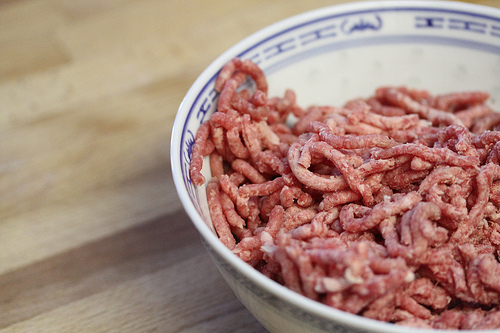
Under no circumstances should you just dig into this with a spoon. (Photo by Danielle Scott.)
People: Cook your burgers.
Cargill Beef recalled 29,339 pounds of fresh ground yesterday after a salmonella outbreak in seven states made 33 people sick. From Food Safety News:
Cargill Beef late Sunday recalled almost 30,000 pounds of 85 percent lean, fresh, ground beef, produced by the company at Wyalusing, PA on May 25, 2012. The meat may be contaminated with Salmonella Enteritidis (SE) associated with an ongoing multiple state outbreak of SE.
USDA’s Food Safety and Inspection Service said it became aware of the the problem “during the course of an ongoing investigation of a multistate outbreak of Salmonella Enteritidis involving 33 case-patients from 7 states (MA, ME, NH, NY, RI, VA, and VT.)”
A problem: The meat is likely no longer in stores.
While the use-by date has passed and these products are no longer available for retail sale, FSIS and the company are concerned that some product may be frozen in consumers’ freezers.
Because the beef was repackaged for consumer sale, it’s not yet clear how impacted packages might be identified. The USDA recall website has some more information, including that they’ve identified meat sold at Hannaford stores in Massachusetts, Maine, New Hampshire, New York, and Vermont as subject to recall. If you have any suspicion at all about the meat in your freezer, Cargill has preparation tips. In short: cook it. Cook it to 160 degrees, and check the temperature. When in doubt, cook it out — that’s a catchphrase we just made up.
The president of Cargill Beef was contrite-ish.
“[W]e are sorry for anyone who became sick from eating ground beef we may have produced,” stated John Keating, Cargill Beef president. “Ensuring our beef products are safe is our highest priority and an investigation is underway to determine the source of Salmonella in the animals we purchased for harvest and any actions necessary to prevent this from recurring.”
Food Safety notes that this is one of at least five such outbreaks in the last 10 years.



